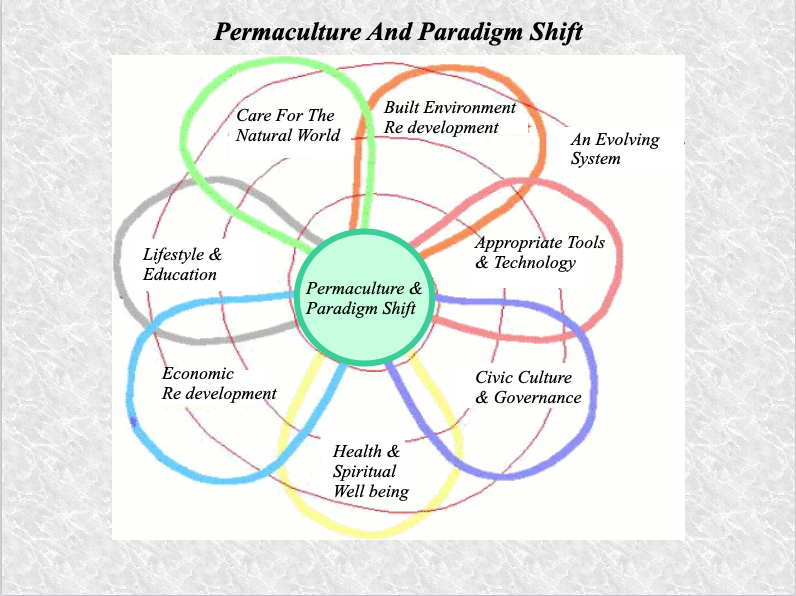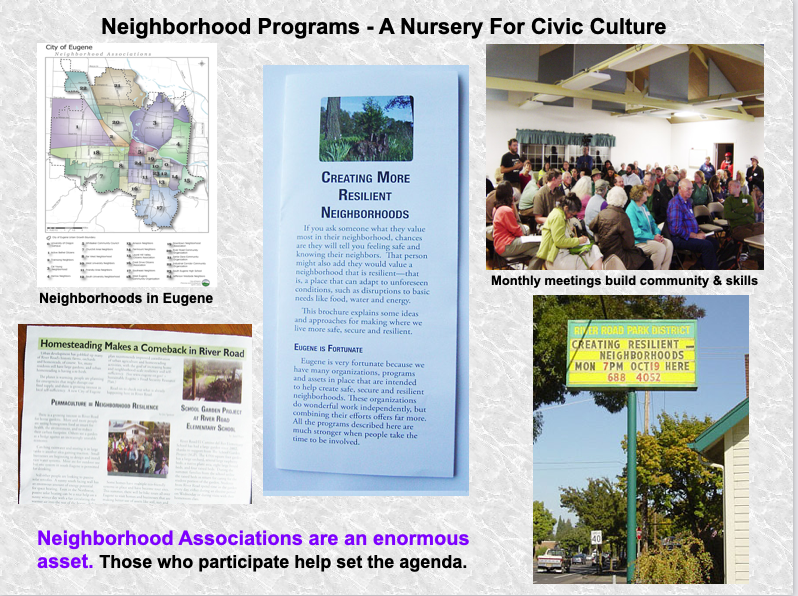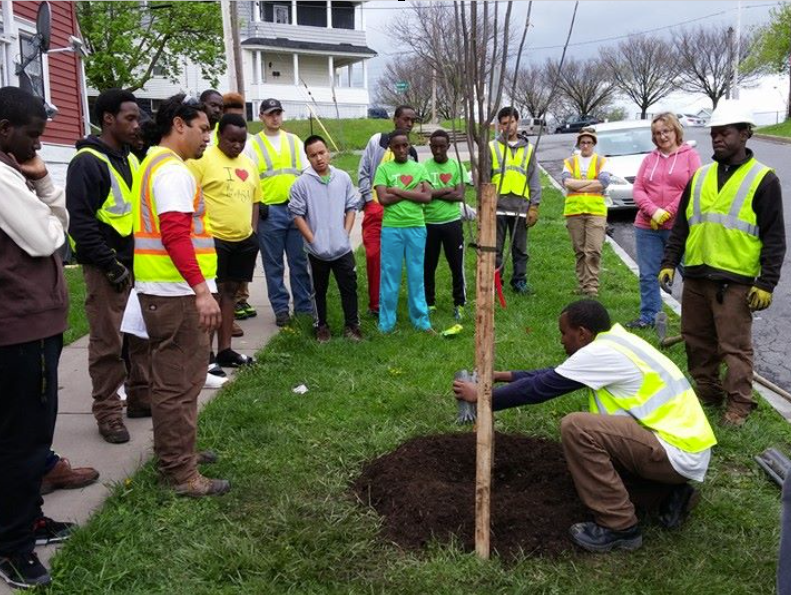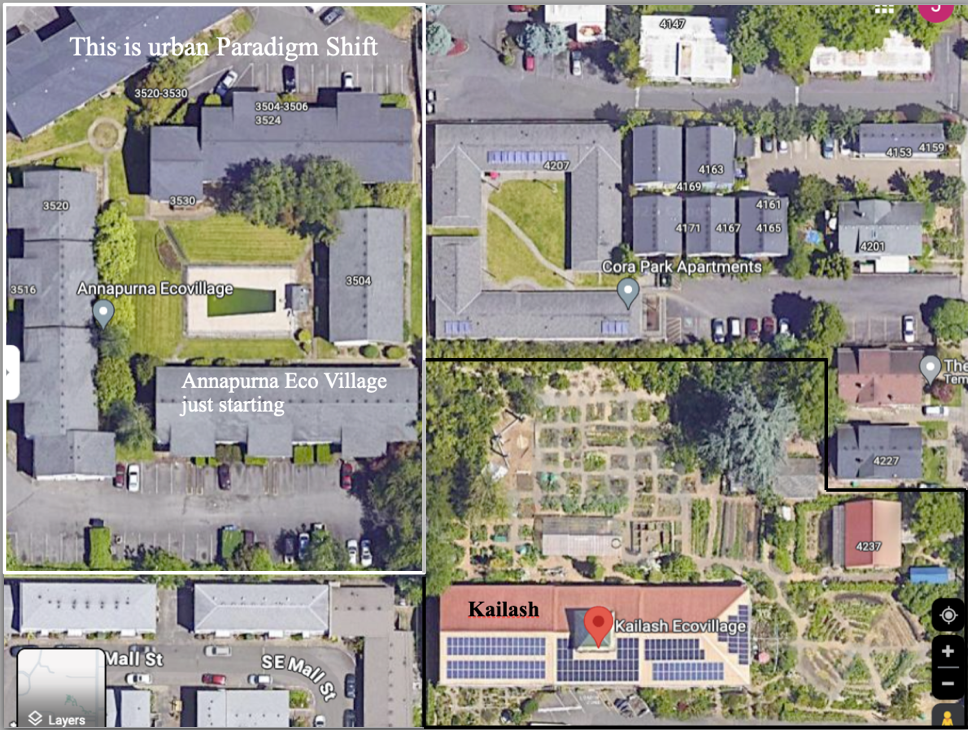Welcome to Article 3, in the series, “A Primer For Paradigm Shift” Article 3 is the second half from article 2, “Aspects of Paradigm Shift.”
As used in the Primer Series, the term “paradigm shift” refers to moving towards a society that lives within the boundaries of the natural world, has a primary goal to bring out the best in positive human potential and is served by an honest economic system.
The term “aspects of paradigm shift” refers to the principles, values, goals, practical tools and actions that help create tactical and strategic structure for moving forward with paradigm shift. Paradigm shift welcomes all participants at any time. Individuals and organizations that share these aspects have built in common cause for working together as a cohesive movement.
Article 3 is the second half of “Aspects.” Article 2 was the first half of aspects.
Article 3 will have a look at allies and assets; permaculture; reject social engineering; civic culture; be the change and more. In Article 2 we looked at the wisdom of the world’s great spiritual traditions, eco footprints, a foot print calculator and why reducing our eco footprints is a core feature of paradigm shift.
Then, how to pay for paradigm shift by prioritizing our time and money and then,closely related, the “double benefit.”
Each part of this series builds on the ones before it. Please check out the previous articles in the series.
Start with this one describing my permaculture home – 23 years of paradigm shift on a ¼ acre suburban property{ https://www.resilience.org/stories/2023-10-06/transforming-suburbia/
Article 1 in the Series, Why Paradigm Shift – a deconstruct of capitalism and the consumer culture{ https://www.resilience.org/stories/2023-10-31/primer-for-paradigm-shift/
Article 2 in the Series, Aspects of Paradigm Shift – eco footprints, priorities of time and money, how to pay for paradigm shift and the double benefit. Products and past times that will not likely make the cut to sustainability: https://www.resilience.org/stories/2023-11-16/a-primer-for-paradigmshift-part-2/
Before we start, here are several core principles and foundations from A Primer On Paradigm Shift.
- A significant amount of paradigm shift can happen in our own lives and homes, with friends and neighbors as soon as we choose to take action.
- Capitalism and the consumer culture are incompatible with environmental sustainability and personal/social uplift.
- Paradigm Shift is not only an issue of ecological sustainability but also an issue of social sustainability.
- The greatest breakthrough needed for paradigm shift and moving towards a sustainable future is in our own consciousness.
- Addressing the dishonesty of capitalism addresses many social, political, economic and ecological issues all at the same time.
- Many of the most challenging & expensive problems facing individuals and our society are totally avoidable. But they are very profitable. That’s why we have them.
- Capitalism and the consumer culture, remarkably, have provided us with an immense variety of tools, assets and opportunities to assist in its own replacement.
- Positive human potential is our greatest renewable resource.
- Every neighborhood and community has surprising allies and assets to work with for creating a preferred future.
- There are untold thousands of people and organizations already working to bring about paradigm shift whether they identify with the term “paradigm shift” or not.
- We can enjoy many of the benefits of paradigm shift as soon as we prioritize our own time & money and take purposeful action. No permission required.
- Countless public interest organizations are on the same team on behalf of sustainability and social justice and can make common cause with each other to multiply their effectiveness.
- We empower our advocacy for paradigm shift when we visibly live the change – our lifestyles, transportation, food choices, how we prioritize our time & money.
There are many more principles of paradigm shift. You can watch the companion four part Primer Series on YouTube with more principles, photos, graphics and narration. Search “Jan Spencer, Primer Series.”
Very good. Here is the second half of “Aspects of Paradigm Shift.”
Allies, Assets and Actions

Any two on the triangle acting together creates more of the third.
Allies and assets plus the ideals of paradigm shift point to action. There are surprising allies and assets in almost any city or town to work with on behalf of paradigm shift. Almost every public interest organization exists to help make the community a better place to live.
Most exist to repair some kind of social, economic or environmental damage caused by capitalism. That means these groups are on the same team. Sometimes we just need to change our perceptions to recognize allies and assets that have been in plain site for years. Changing conditions will change our perceptions. With luck, more and more people will recognize the need for paradigm shift and take action.
Allies and assets can include schools, faith groups, community centers, ad hoc groups, neighborhood associations, non profits of all kinds, friends, neighbors, city programs. Every individual and work place can be an asset. We all have an interest in making where we live healthier, more secure, cohesive and resilient; especially given the news we read about every day.
A run down, derelict apartment complex can be an asset when turned into a thriving eco village. [see kailashecovillage.org] Having a permaculture convergence at a neighborhood recreation center is a great benefit to the community. Our own time and money are enormous assets for helping to bring about sustainability and paradigm shift where we live and in our communities.
Create a more resilient property with a smaller eco footprint instead of a kitchen remodel. Donate and/or volunteer for a worthy cause.
Assets can include a suburban property to transform into a paradigm shift role model thousands can visit so they can do likewise. [See a video tour of my place. https://www.youtube.com/watch?v=bsO4K1gG2Ao] A city’s neighborhood program can advocate permaculture and more neighborhood gardens. In Port Townsend, WA, local people have a financial tool to invest in local eco friendly start ups.
The internet, such as Meetup groups are a great asset. One could offer free zoom presentations about paradigm shift. Our own time and money are immense assets.
We used our neighborhood recreation center for a large permaculture event that counted over 700 participants. We had workshops, plenary sessions, an outdoor expo, site tours in the nearby neighborhood and a lot more. Any rec center, church, temple, mosque could host progressive community events. Some already do.
Thousands of public interest organizations could advocate more fully on behalf of paradigm shift, even without using the specific term. We will explore that topic “Taking Paradigm Shift To A Wider Audience” in an upcoming article in the Primer Series.
Permaculture

Permaculture is a powerful set of values, principles and ideals to design systems for taking care of human needs in ways that are friendly to people and planet. Permaculture can be applied at any scale from personal to regional to beyond. Permaculture can be used to design a suburban property, an economic system or a lifestyle.
Permaculture is a holistic design system for taking care of human needs in ways that are healthy for people and planet. Many people identify permaculture with gardening but the principles can be applied to any project having to do with humans taking care of their needs – food, energy, transportation, urban design, economics and by extension, culture and lifestyle.
Permaculture combines traditional knowledge for healthy living with modern social and biological science. Several of the core principles include working with nature rather than at cross purposes. Also design holistically for multiple benefits, fair share and efficiency. Other principles include produce no waste, choose simple and slow solutions, use edges and value the margins.
There is a great deal about permaculture on the internet including videos showing permaculture projects in real life. There is a link to my suburban permaculture project mentioned above. The video clearly explains how the permaculture property supports many aspects of paradigm shift.
Permaculture can be described as a new international language. There are permaculture advocates and enthusiasts all over the world. There is limited global organization but there is relative uniformity in what is called a PDC, a permaculture design course. There is a national organization in the US with the intention to help insure the quality and content of PDCs and their teachers as well as moving permaculture further out in the public realm.
Permaculture principles are perfect for paradigm shift, from home scale to the neighborhood, community, region and beyond. A personal lifestyle, urban land use and a nation’s economic system could be designed with permaculture principles.
Reject Social Engineering

Saying no thanks to social engineering can liberate our time and money from distractions to uplift and paradigm shift instead. The photo shows apple pressing at a neighborhood event in the River Road Neighborhood, Eugene, Oregon. People made time available to organize the event and people made time to participate. This is a perfect example of choosing paradigm shift rather than social engineering because P Shift builds community and civic culture.
The consumer culture advocates and depends on excess – extraction, production, promotion, consumption and throwing away. We certainly need food, shelter, comfort, security, creative outlet, hangout time and mobility but capitalism requires a growing economy that needs excess production and consumption to grow the GNP, keep people employed and distracted, pay off debts and to do something with the enormous wealth created by externalizing the costs of production, use and disposal onto people and planet; essentially trillions of dollars in dishonest subsidies to capitalism and middle class/affluent lifestyles.
We have been trained our entire lives to believe the consumer culture is the best of all possible worlds. It is the American dream.
But the consequences are enormous eco footprints, climate change, wide spread self medication, remarkable disparity between the haves and have nots, lost human potential, political fragmentation, on and on. Recall how capitalism as we know it is the common denominator for practically every major social, environmental, public health, economic and political problem we have today, as explained in Parts 1 and 2 in this series.
The average American is hit with hundreds of advertisements per day ranging in scale from in your face to what some call subliminal. Hundreds of billions are spent on advertising per year on TV, internet, t shirts, billboards, social media, events, sports stadiums, on and on. We are immersed in advertising and its impossible to fully ignore. Those billions would not be spent if those who spent the billions on the ads [Coca-Cola $4 billion/year on its own] didn’t think it delivered results. Yes, results are delivered.
Repeat messages often enough and for long enough on behalf of the consumer culture and you have social engineering. Many ads are crafted to appeal to the less desirable qualities of our human species – vanity and excess.
The ads are often lifestyle messages. The products shown are your ticket to excitement, glamour, beautiful people in beautiful places. Cars, junk food, electronics, consumer products. The System invents problems and then invents solutions.
There are many reasons for mental illness, anti-social behavior and an epidemic of self-medication both legal and not legal, to treat social/psycho disorders.
Widespread and chronic overstimulation from advertising and using many familiar products, particularly from large and small screens, cannot help but be a primary source of so many of society’s problems.
Junk food is formulated to jolt the senses with big doses of salt, sugar, additives, colors and serving sizes that make what you eat even more damaging. Children are targeted, the planet suffers, human progress suffer. We have so many downward trends and all in the name of the free market.
The consumer culture is not compatible with eco logical and social sustainability. A rejection of social engineering and excess is a critical part of paradigm shift.
Reject Social Engineering
- Media Literacy – We can be empowered to push back, simply by realizing how advertising is social engineering and the results of social engineering – the consumer culture – is not healthy for people and planet. Our lives, society and economic system do not have to be like this and we can do something about it. The Primer is here to help.
- Prioritize our time and money. When we know what social engineering is, we can purposefully put our time and money to better use.
- Re sensitize our lives so we can more appreciate nature, our friends, families, subtleties of life, our own selves in ways that are far less resource intensive. We can adjust our perceptions and physical senses to gain more enjoyment from less business generated stimulation.
- Paradigm Shift. Replace the consumer culture with paradigm shift in our own lives. Even better, share that adventure with friends, family, neighbors.
Pushing back on social engineering gives us the opportunity to join with untold numbers of other people who share a positive ideal for what humans are capable of. The Primer is here to help.
Civic Culture

Civic culture is caring about where we live, the environment, friends and neighbors. Civic culture is taking time to participate in the life of the community for making it a better place for everyone.
A rejection of social engineering gives us the capacity to put our time, effort and money into being a part of paradigm shift. One of the most important tasks of paradigm shift is to build civic culture.
Civic culture is a condition where people care about where they live and make time to participate in the life of the community. Civic culture builds safety, security and well being in neighborhoods, communities, regions and the nation along with safe guarding the natural world. Civic culture can flourish when people share basic ideals about social uplift, democracy, an accountable economic system, a healthy environment and their own role in protecting the well being of people and planet.
Civic culture is inclusive. People feel like they are valued and their well being is tied to the well being of others in the community and the natural world. Schools, non profits, faith groups and many others already have a platform. They can expand their agendas above what they already do. We will go into more detail about taking paradigm shift to a wider audience in an upcoming part of the Primer Series.
Many cities have neighborhood programs which provide helpful services and oftentimes a small budget to neighborhood associations. Typically, a neighborhood association [NA] meets monthly with a meeting agenda and program. There is a board and chair. There might be working groups or committees with interests in land use, the environment, social justice, business or any topic people care to put time and effort into.
The NA can organize public events and workshops. They confer with the city. Typically, there is a monthly meeting where leaders from the city’s various neighborhood associations meet with each other to discuss broader issues relating to neighborhoods.
A neighborhood association has standing in the community and typically reaches out to the neighborhood with snail mail, has a website, puts out an e newsletter and organizes programs of interest to the neighborhood. NAs can be a place where individuals share their particular interests with a wider audience. Those who participate, create the NA’s agenda and that agenda can include permaculture and paradigm shift. Neighborhood associations are a nursery for civic culture – learning the skills working with others for the good of the neighborhood and community.
Of course, there are many ways to participate in and create civic culture. Almost any public interest non profit welcomes volunteers. Any group of neighbors or friends can meet and make common cause in positive ways. One can mentor or tutor young people or help with a local environmental cause. Paradigm shift welcomes everyone.
Be The Change

The photo shows the Onandaga Earth Corps in Syracuse, New York. Young people learn life skills of leadership, care for the natural world, care for the well being of the community. They are empowered to be the change.
Paradigm shift will not happen without visible examples of what it is, whether turning a run down apartment complex info an eco village, creating ways to invest money in local healthy business, adopting a filbert grove on public property, empowering young people in positive ways or untold other possibilities.
Being the change in our everyday lives is critical and even better, becoming an advocate of sustainability and a preferred future. This is not a time to be shy. A future article in the Primer Series will go into “moderate” detail about what a “paradigm shift lifestyle” might look like.
Being the change – what we do with our time and money. Visible examples of paradigm shift make the strongest impressions. Travel, food, fun, recreation. Yes, we have our lives to live but we can find creative ways to combine taking care of what we need to do with reducing eco footprints and making responsible choices for food, transportation, recreation and all the rest.
There are many aspects to paradigm shift. Several have been described in this Primer. Everyone can expand the adventure and share what we are learning from own experiences. This Primer is exactly that. Add to it. Share it with others! The next article will describe what might a sustainable lifestyle look like.
According to the Global Footprint Network’s footprint calculator [see article two in this series] planet earth could support this lifestyle’s level of energy and resource consumption and waste production for the planet’s 8 billion people.

Turning a run down and derelict apartment complex into a thriving eco village. This act combines every ideal and value in Paradigm Shift – reducing eco footprints, creating alternatives to capitalism, self and group empowerment, applied permaculture, service to the community, uplift of the spirit, care for the natural world, repair of existing urban infrastructure, making smart use of time and money. Everything!
After the lifestyle article, we will explore a wide range of on the ground examples of paradigm shift. These stories describe recognizing assets, finding allies and taking action. We will start with Kailash Eco Village in Portland, Oregon. The story makes alchemy look real. A run down, derelict apartment complex becomes a thriving, creative, productive eco village.
We’ll also “visit” Our 42nd Av. A small non profit economic development corporation in Portland’s Cully Neighborhood. Our 42nd Av has an impressive track record of revitalizing this area of Portland with a farmer’s market, small business incubation, repurposing a commercial building. All this and more with a social and planet friendly sensitivity to the surrounding neighborhood.
And we will also check in with the Onondaga Earth Corps in Syracuse, New York. A local non profit that teaches young people leadership and life skills and community engagement learning about clean water, school gardens and urban forestry. And there are many other great stories to share about paradigm shift already in action. If you know of any great stories like these, please share them with others. Write an article for Resilience or tell me via my website.
You can find links to related content, suburban permaculture, contact me at suburbanpermaculture.org. Also, you can search “Jan Spencer, Primer” on you tube for presentations about paradigm shift that parallel these articles in Resilience but also have narration, photos, images and graphics.
|
ABOUT THE AUTHOR
Jan Spencer is an advocate of suburban permaculture and paradigm shift in Eugene, Oregon. His focus of interest is care for the natural world, economics, urban land use and eudaimonia. His background is thoroughly middle class having lived in suburban locations much of his life in New York, Texas and currently in Eugene, Oregon. Jan earned a BA in Geography in 1974, has Permaculture Design Certificate from 1991 and has travelled out of the country for about 6 years to nearly 40 different countries. In recent years, visits to Europe have included a keen interest in urban public places, pushing back on cars and exploration by bicycle. Find links to "A Primer For Paradigm Shift" on his website. Jan is vegetarian and does not own a vehicle other than a muscle powered bike. He welcomes opportunities to speak with classes, events and organizations. You can contact Jan through his website, Suburban Permaculture.
|